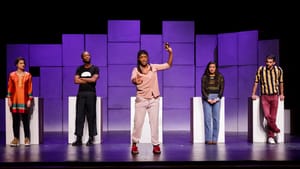Stay in the Loop
BSR publishes on a weekly schedule, with an email newsletter every Wednesday and Thursday morning. There’s no paywall, and subscribing is always free.
Too much of a good thing
Philly Fringe 2019: Kaneza Schaal and Christopher Myers present ‘Cartography’

What do you believe in? What are your dreams? What or who is your god? And where do they lie on the map? Cartography is a curated 2019 Fringe Fest performance that asks those questions of its audience—who may or may not already be aware of their own answers—through the lenses of immigration in a post-modern world constantly parsing through information. While undoubtedly an important work, Cartography is an ambitious show exemplifying what “too much of a good thing” looks like.
Drawing a new route
Cartography looks at a group of immigrants (there were only four actors on opening night, though five are billed) who trace the maps of their journey from old homes to new ones. Hailing from El Salvador, Syria, Lebanon, South Africa, and Rwanda, the migrants all find themselves in an immigration office somewhere. This is where the lack of clarity begins.
The narrative spends much of its time with the characters talking about other people in their lives. Anecdotes about relatives or friends or people who passed by occupy much of the first half of the show, stagnating any momentum for the protagonists. The characters want you to stay with them, to listen to their stories, which would be fine—if it were their stories we were listening to, instead of second-hand experiences of characters we’ll never meet.
It gets there in the end. Individually, the migrants share their childhood upbringings. These monologues tug and pull between heartwarming and heart-wrenching, but that doesn’t change the passive storytelling style that stymies the show. And by this time, it’s already too late to pivot.
Disjointed filiation
Cohesion never arrives with these stories. We know these people are going somewhere. We know they exist in contemporary times. There’s danger crossing borders. There’s yearning for family and friends. There are questions of identity and culture and heritage that are certainly reverent and pertinent. They feel like real stories from real people, and considering the source material, director Kaneza Schaal and writer Christopher Myers may have put a documentary on the stage. But, as a unit, the foundation and the sentiments conveyed in the diasporas coalesce to a blur. I left the show exhausted and disoriented. Hours later, their narratives felt the same after contemplating them. And the more I thought about the show, the more disjointed and disconnected it felt.

Less could’ve been more
I would’ve loved for this show to be focused and synthesized through one person’s perspective. I found myself reaching for an arc, and battled with the thought that maybe there isn’t supposed to be one. The implementation of interactive video technology left even more to be desired: it didn’t show up until towards the end of the show, and its arrival was jarring and subject to inevitable opening-night technical difficulties. When it worked, it was interesting, but the end result was but a fleeting glimpse that you could’ve missed if you were still interacting with the show’s display on your phone.
With a simple set design that I greatly appreciated, Cartography delivers an aimless albeit significant anthology of new world tradition that felt didactic and effusively handholding.
I wanted to like Cartography, especially being a fan of Christopher Myers. Perhaps many will find something in this show, but in the end, I wanted less from the performance.
What, When, Where
Cartography. By Christopher Myers, directed by Kaneza Schaal. Through September 15 at Christ Church Neighborhood House, 20 N. American Street, Philadelphia. (215) 413-1318 or fringearts.com.
Christ Church Neighborhood House has ADA-compliant restrooms and an elevator to the fourth-floor performance space, though the surrounding neighborhood streets can be challenging. There is floor-level seating available. There will be relaxed performance of Cartography on September 15 at 3pm.
Sign up for our newsletter
All of the week's new articles, all in one place. Sign up for the free weekly BSR newsletters, and don't miss a conversation.

 Kyle V. Hiller
Kyle V. Hiller